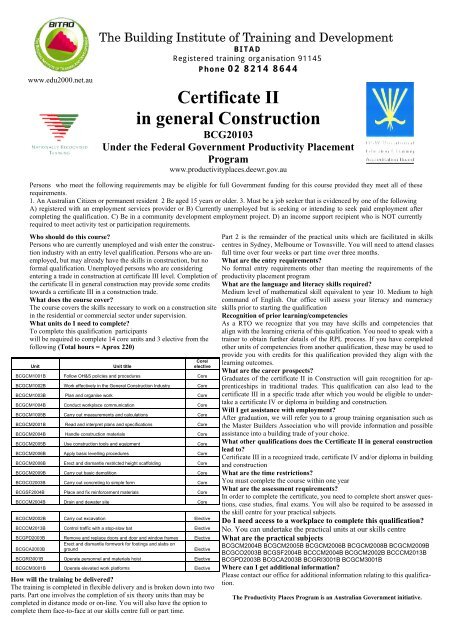Cert II brochure Productivity placement program.pub
Cert II brochure Productivity placement program.pub
Cert II brochure Productivity placement program.pub
Create successful ePaper yourself
Turn your PDF publications into a flip-book with our unique Google optimized e-Paper software.
www.edu2000.net.au<br />
The Building Institute of Training and Development<br />
BITAD<br />
Registered training organisation 91145<br />
Phone 02 8214 8644<br />
<strong>Cert</strong>ificate <strong>II</strong><br />
in general Construction<br />
BCG20103<br />
Under the Federal Government <strong>Productivity</strong> Placement<br />
Program<br />
www.productivityplaces.deewr.gov.au<br />
Persons who meet the following requirements may be eligible for full Government funding for this course provided they meet all of these<br />
requirements.<br />
1. An Australian Citizen or permanent resident 2 Be aged 15 years or older. 3. Must be a job seeker that is evidenced by one of the following<br />
A) registered with an employment services provider or B) Currently unemployed but is seeking or intending to seek paid employment after<br />
completing the qualification. C) Be in a community development employment project. D) an income support recipient who is NOT currently<br />
required to meet activity test or participation requirements.<br />
Who should do this course?<br />
Persons who are currently unemployed and wish enter the construction<br />
industry with an entry level qualification. Persons who are unemployed,<br />
but may already have the skills in construction, but no<br />
formal qualification. Unemployed persons who are considering<br />
entering a trade in construction at certificate <strong>II</strong>I level. Completion of<br />
the certificate <strong>II</strong> in general construction may provide some credits<br />
towards a certificate <strong>II</strong>I in a construction trade.<br />
What does the course cover?<br />
The course covers the skills necessary to work on a construction site<br />
in the residential or commercial sector under supervision.<br />
What units do I need to complete?<br />
To complete this qualification participants<br />
will be required to complete 14 core units and 3 elective from the<br />
following (Total hours = Aprox 220)<br />
Unit<br />
Unit title<br />
Core/<br />
elective<br />
BCGCM1001B Follow OH&S policies and procedures Core<br />
BCGCM1002B Work effectively in the General Construction Industry Core<br />
BCGCM1003B Plan and organise work Core<br />
BCGCM1004B Conduct workplace communication Core<br />
BCGCM1005B Carry out measurements and calculations Core<br />
BCGCM2001B Read and interpret plans and specifications Core<br />
BCGCM2004B Handle construction materials Core<br />
BCGCM2005B Use construction tools and equipment Core<br />
BCGCM2006B Apply basic levelling procedures Core<br />
BCGCM2008B Erect and dismantle restricted height scaffolding Core<br />
BCGCM2009B Carry out basic demolition Core<br />
BCGCO2003B Carry out concreting to simple form Core<br />
BCGSF2004B Place and fix reinforcement materials Core<br />
BCCCM2004B Drain and dewater site Core<br />
BCGCM2002B Carry out excavation Elective<br />
BCCCM2013B Control traffic with a stop-slow bat Elective<br />
BCGPD2003B Remove and replace doors and door and window frames Elective<br />
Erect and dismantle formwork for footings and slabs on<br />
BCGCA2003B ground<br />
Elective<br />
BCGRI3001B Operate personnel and materials hoist Elective<br />
BCGCM3001B Operate elevated work platforms Elective<br />
How will the training be delivered?<br />
The training is completed in flexible delivery and is broken down into two<br />
parts. Part one involves the completion of six theory units than may be<br />
completed in distance mode or on-line. You will also have the option to<br />
complete them face-to-face at our skills centre full or part time.<br />
Part 2 is the remainder of the practical units which are facilitated in skills<br />
centres in Sydney, Melbourne or Townsville. You will need to attend classes<br />
full time over four weeks or part time over three months.<br />
What are the entry requirements?<br />
No formal entry requirements other than meeting the requirements of the<br />
productivity <strong>placement</strong> <strong>program</strong><br />
What are the language and literacy skills required?<br />
Medium level of mathematical skill equivalent to year 10. Medium to high<br />
command of English. Our office will assess your literacy and numeracy<br />
skills prior to starting the qualification<br />
Recognition of prior learning/competencies<br />
As a RTO we recognize that you may have skills and competencies that<br />
align with the learning criteria of this qualification. You need to speak with a<br />
trainer to obtain further details of the RPL process. If you have completed<br />
other units of competencies from another qualification, these may be used to<br />
provide you with credits for this qualification provided they align with the<br />
learning outcomes.<br />
What are the career prospects?<br />
Graduates of the certificate <strong>II</strong> in Construction will gain recognition for apprenticeships<br />
in traditional trades. This qualification can also lead to the<br />
certificate <strong>II</strong>I in a specific trade after which you would be eligible to undertake<br />
a certificate IV or diploma in building and construction.<br />
Will I get assistance with employment?<br />
After graduation, we will refer you to a group training organisation such as<br />
the Master Builders Association who will provide information and possible<br />
assistance into a building trade of your choice.<br />
What other qualifications does the <strong>Cert</strong>ificate <strong>II</strong> in general construction<br />
lead to?<br />
<strong>Cert</strong>ificate <strong>II</strong>I in a recognized trade, certificate IV and/or diploma in building<br />
and construction<br />
What are the time restrictions?<br />
You must complete the course within one year<br />
What are the assessment requirements?<br />
In order to complete the certificate, you need to complete short answer questions,<br />
case studies, final exams. You will also be required to be assessed in<br />
the skill centre for your practical subjects.<br />
Do I need access to a workplace to complete this qualification?<br />
No. You can undertake the practical units at our skills centre<br />
What are the practical subjects<br />
BCGCM2004B BCGCM2005B BCGCM2006B BCGCM2008B BCGCM2009B<br />
BCGCO2003B BCGSF2004B BCCCM2004B BCGCM2002B BCCCM2013B<br />
BCGPD2003B BCGCA2003B BCGRI3001B BCGCM3001B<br />
Where can I get additional information?<br />
Please contact our office for additional information relating to this qualification.<br />
The <strong>Productivity</strong> Places Program is an Australian Government initiative.
Summary of Participant Guidelines<br />
Enrolment<br />
All participants must complete an enrolment form for all courses. Participants will be notified of the result of their enrolment with 14 days<br />
of submission. Appeals can made for decisions relating to enrolments.<br />
Fees and Charges<br />
Course fees are inclusive of all materials.<br />
Fees paid in advance will be refunded in full so long as the participant has not started the course. Refunds for course fees after the beginning<br />
of the course will be at the discretion of the CEO of BITAD.<br />
Assistance with Language, Numeracy and Literacy (LN&L)<br />
When enrolling in our courses, please indicate any LN&L assistance that you may require. Our course information sheet outlines the minimum requirements<br />
for LN&L for completion of the course. Please contact us for further assistance.<br />
Access and Equity<br />
BITAD is committed to the promoting and encouragement of participants from the following groups. Woman, the elderly, people with<br />
disabilities, people from rural areas, indigenous people, people from non-English speaking backgrounds and people with learning difficulties.<br />
We will not discriminate or deny access to any participant on the grounds stated above.<br />
Participants Welfare<br />
At BITAD, we are committed to assisting our clients with quality training and learning assistance.<br />
Recognition of Prior Learning<br />
As an RTO, we recognise any national accreditation issued by another national RTO. We also recognise that you may have previous<br />
experience and competencies relating to the course you are applying for. Please contact us for further information.<br />
Assessment Guidelines<br />
Assessment requirements are outlined in this course information sheet. BITAD is committed to the values of fairness, equity and flexibility<br />
in relation to course assessments and will ensure sufficient evidence is gathered for a thorough assessment. We will also provide<br />
feedback on any assessment you complete and offer the necessary guidance. BITAD has an established procedure for appealing of an<br />
assessment decision.<br />
Complaints, Grievances and Appeals<br />
Clients who are dissatisfied for any reason regarding BITAD services or decisions, have the right to have their complaints or grievances<br />
dealt with in a professional, confidential, and expedient manner.<br />
Conduct and Ethics<br />
BITAD believes that the professional, ethical and equitable conduct of our staff and representatives is of the upmost importance. Our<br />
business practices and staff are governed by a rigorous code of conduct and ethics.<br />
Access to Personal Records<br />
Participants may access their personal records during normal business hours.<br />
The Vocational Education and Training Act 1990<br />
BITAD is a registered training organisation under the Australian Quality Training Framework. The skills and qualifications attained by<br />
participants who have undergone competency-based assessment are nationally recognised. Assessments are carried out in such a way<br />
so as to be reliable, flexible and fair.<br />
Timeframes for Completion of Assessments<br />
Candidates have 2 months from the date of enrolment to submit all substantiating evidence for their application for RPL and or credit<br />
transfer of their qualifications. All other assessments must be completed and submitted 2 months from the date of completion of their<br />
course.<br />
Records Management<br />
BITAD's collection of student information and records management policy and practice is compliant with the following legislation and<br />
standards:<br />
The Australian Quality Training Framework (AQTF) - Standard 4 Effective Administrative and Records Management Procedures VETAB<br />
Records Management Guidelines Privacy Act 1988 - National Privacy Principles<br />
Student's results (i.e. copies of certificates, statements of attainment and records of competency) are securely retained for a period of<br />
thirty (30) years.<br />
Training and Assessment Documentation<br />
BITAD is required by the NSW Vocational Education and Training Accreditation Board (VETAB) to retain the following records, which<br />
must be made available for examination if required for audit purposes:<br />
Training and Assessment Documentation<br />
. Records of student assessments (including an assessment portfolio for each student, records of assessment of competencies, and<br />
any assessment activities conducted for the purposes of granting recognition of current competency or prior learning or credit transfer).<br />
Student attendance details for all sessions of training. Transcripts of student's outcomes.<br />
Credit Transfer Applications<br />
This process enables a candidate to receive direct credit for credentials recognised within the Australian Qualifications Framework,<br />
which are issued by another RTO (registered training organisation).<br />
Protection of Participants Information<br />
The NSW Department of Education and Training (DET) requires BITAD to submit computerised statistical returns on training and assessment<br />
activity quarterly. DET (through the NSW Board of Adult and Community Education) then gives this information to the National<br />
Centre for Vocational Education Research (NCVER) which is responsible for the collection of national vocational education and<br />
training (VET) statistics for the federal government. Except as required under the Standards for Registered Training Organisations<br />
or by law, details of a student's training and assessment will not be disclosed to a third party (for example, their<br />
employer) without the student’s written consent.<br />
Welfare and Discipline Policy<br />
BITAD provides on-going student support and has policies and procedures in place for disciplinary actions where necessary.<br />
Further information surrounding these procedures can be found in our participants handbook or by contacting our<br />
office.<br />
Please contact BITAD for a full version of the participants handbook



